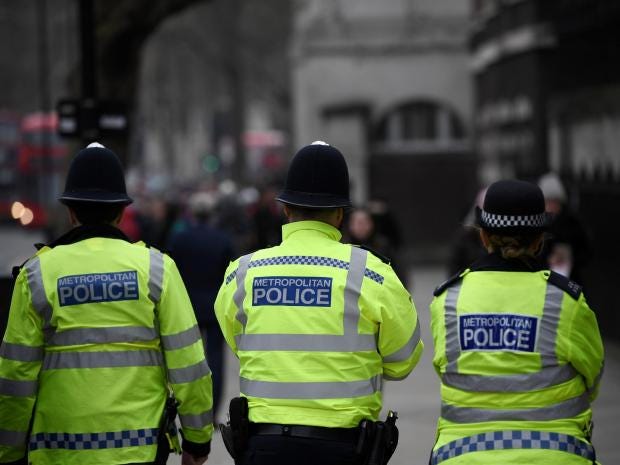Police forces are allowing perpetrators of domestic violence to escape justice by “pushing responsibility” for prosecutions on to victims, rather than building cases themselves, the police watchdog has warned.
Officers need to “get on with their jobs” and track down evidence so they can pursue cases against offenders without relying on vulnerable victims to provide testimony, according to Zoe Billingham, who leads on domestic violence for Her Majesty’s Inspectorate of Constabulary (HMIC).
Forces are failing to use their powers to protect abuse victims, with the variations in standards between counties described by Ms Billingham as “astonishing”.
Her comments come after The Independentrevealed that the numbers of domestic violence cases dropped by police after victims withdrew their support for prosecution rose dramatically last year.
Figures showed that more than 160,000 cases were dropped in 2016 – a number that soared by almost 40 per cent on the previous 12 months.
The revelations prompted fears that cuts to policing and support services were undermining attempts to convict perpetrators of domestic violence.
Dire warnings about the treatment of vulnerable people by the police in previous years have led to officers taking a more victim-centred approach – a direction the HMIC broadly praised in a review of the nation’s policing published last month.
But Ms Billingham has now warned that taking this approach with victims of domestic violence was backfiring, inadvertently increasing the burden on vulnerable people.
“We need to stop pushing responsibility onto the victim,” Ms Billingham told The Independent.
“The police need to be taking their responsibilities seriously and getting on with it.
“They wouldn’t tell a victim of burglary: ‘Do you want us to do something about this?’ Would that ever happen? So why should that question be put – and we know it still is – to victims of domestic abuse?”
She added: “This balance between listening to what the victim says and actually getting on and doing your job is clearly being distorted in some areas and leading to all sorts of outcomes. The police have got to do their job. They have powers … they need to use those powers.”
Prime Minister Theresa May announced a review of the handling of domestic abuse cases in February, promising £20m in extra funding for specialist support services and pledging to “transform” the way the problem was addressed.
The Independent has highlighted a series of failings in the system, including the numbers of police charges being brought falling dramatically, as well the sharp increase in victims withdrawing their support for prosecutions.
In Hampshire in 2016, 63 per cent of victims dropped out from pressing charges, and in three other counties – Kent, Cleveland and North Yorkshire – more than half of victims did the same, information obtained from 34 of 39 police forces under freedom of information laws showed.
Meanwhile, in Derbyshire, only six per cent of victims withdrew their support for police action in 2016.
Ms Billingham said the disparity between regions demonstrated that cuts to police funding were not entirely to blame.
“We are very worried about the number of victims not supporting police action and the variation [between police forces] is astonishing. It’s clearly not acceptable,” she said.
She called on the College of Policing, an organisation that sets policing standards “to be much more clear about the guidance given to officers” in cases where victims were unwilling or unable to cooperate and said police needed to get better at building cases against offenders.
“Evidence from witnesses; forensic evidence and photographic evidence – we want to see more forces pushing for that and taking responsibility off the victim,” the inspector said.
She added that body-worn cameras should be mandatory when police attend domestic violence incidents. Trials of the technology by the College of Policing have shown a “significantly higher proportion” of violent offenders charged when officers filmed their attendance at crime scenes.
Despite increased focus on protecting victims, there are still five forces that the HMIC considers inadequate in their handling of victims, and the watchdog says problems continue nationwide.
Abuse of authority for sexual gain by police officers was widespread, the HMIC said in a report released last week, with all but one force having at least one reported allegation. Over a third of these allegations – 39 per cent – involved victims of domestic abuse.
Evidence has also emerged of officers downgrading the severity of domestic violence cases into less urgent categories, to ration resources.
In response to statements from Ms Billingham about the police’s reliance on survivors’ testimony, Polly Neate, chief executive of Women’s Aid, said: “The job of the police is to build the case for the victim, not the other way around.
“In domestic abuse cases, often too much weight is placed on the victim making a statement and then giving evidence, when the police have not taken advantage of other forms of evidence – for example, footage from body-worn cameras taken at the scene of the crime.
“A woman may well feel unsafe to give evidence, and she may be right: it is very usual for abuse from the perpetrator and his network to continue even after separation. The first response a woman gets from the police – if it is the right response – can be the difference between life and death.”
Deputy Chief Constable Louisa Rolfe, National Police Chiefs’ Council lead for domestic abuse, said officers must ensure that people are not being intimidated into dropping cases by abusive partners.
“Where there is evidence of abuse we should be seeking to prosecute and, with the Crown Prosecution Service, we have tried and tested ways of supporting victims who are reluctant to progress with a prosecution,” she said.
“We have known for some time that many victims only report after suffering sustained abuse and we have now got much better at recording this accurately. Our data is improving and we are working to understand the issues identified by Her Majesty’s Inspectorate of Constabulary.”

